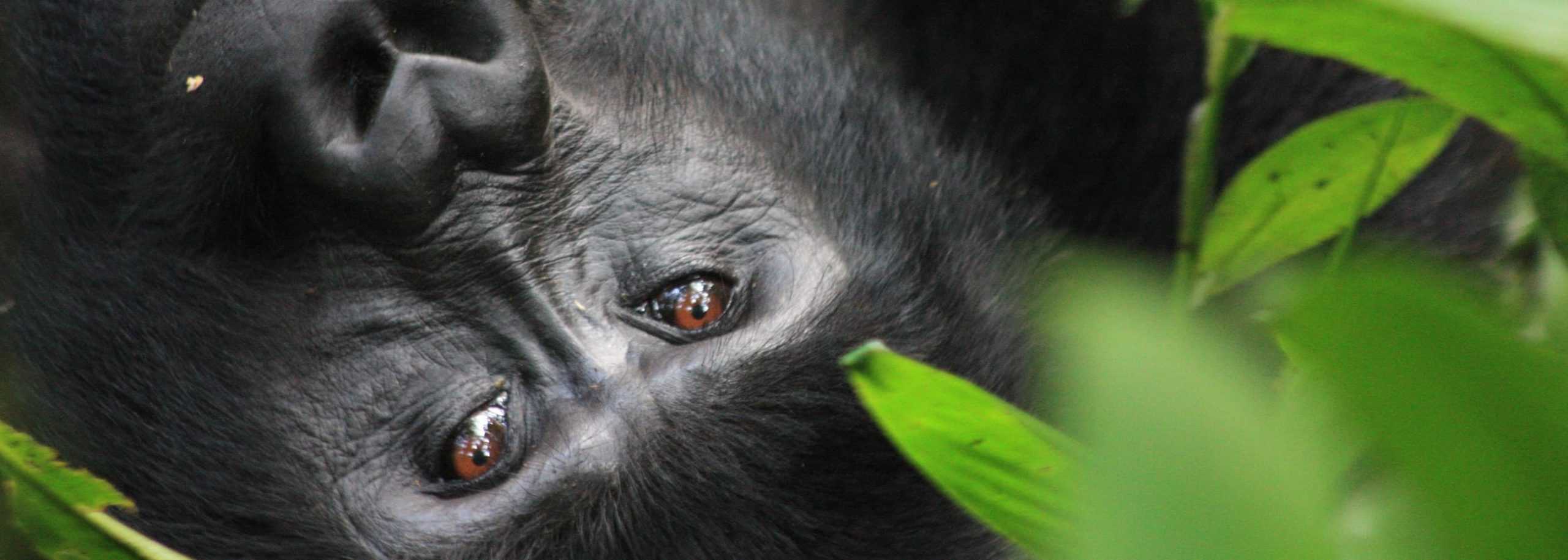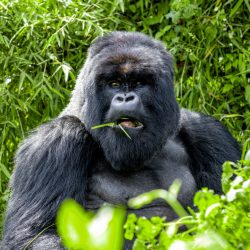Documenting the Families of Volcanoes National Park
Blog | 5/03/10
The puffy white clouds were morphing to gray as we stood in front Sabyinyo Volcano’s knotty peaks. As they are want to do, they started creeping towards the mountain’s spine. I knew that in an hour or two they would swallow the peaks whole, then spread again, likely depositing big fat raindrops on forest and farm below.
I am bumping around Volcanoes National Park in Rwanda today with award winning photographer Mattias Klum. The Park and its environs can provide a lifetime’s worth of award winning images, but Mattias has another purpose on this trip: to document the beginning stages of the IGCP led mountain gorilla census in the Virunga Volcanoes Massif. It’s been seven years since the last census here, and these counts give us vital information about the state of the mountain gorilla, and its conservation, in this land of overgrown Eden and fickle sky. In two months time, we hope to have a fairly accurate count of all the gorilla populations that romp across the Virungas, using that data to inform conservation action for now and the future.
The Virungas are more than the wondrous playground of the gorillas and rain-scrubbed volcanoes – the densely populated slopes burst with villages – families scratching out a living in the chocolate volcanic soil. Today we will slip into these tight-knit communities, documenting the challenges of everyday life, learning how the people of Kinigi village and its surrounding hamlets live with and within this demanding environment. The IGCP community walk project provides visitors with a true insight into the rhythms of life here, and adds to families’ alternative income sources, thus reducing pressure on the National Park and its own families.
But we don’t even come to stop before a gaggle of smiling kids have formed an audience. We are looking for Josephine, who weaves traditional mats – a vital component to every household, whether they be used for sleeping, doors or simply drying maize in the sun. Josephine’s shy smile gives her away and we decline an offer for a quick lesson in weaving: our clumsy hands would be no match for her quick, dexterous finger work.
As we head out into the field to find the local blacksmith, clumps of pinkish-red skinned potatoes appear, freshly unearthed and drying in the sun. It is harvest time, and our path snakes through overturned potato fields on the right and the purplish-yellow stumps of recently harvested corn stalks on the left. Work never stops here, and a wiry old mama, with her bright yellow sarong, is pitching into fragrant soil with a local hoe. I try my hand at it, but the muscles ache after only turning over a few clumps. This is hard work.
After documenting the blacksmith shaping local tools, we have a sip of the local brew: banana beer. The milky brown liquid is both sweet and sour, sliding down the throat without the normal alcohol burn. After a few sips, I notice the clouds spreading back out. Rain is imminent.
The sky ruptures as we hike up the ridge to the next village, Musanze town simmering in the valley below, like the steam rising from one of those freshly boiled local potatoes after quickly slicing it open. Behind, the layers of Rwanda’s “thousand hills” stack on top of each other in layers, like elegantly constructed origami. We stop at a tree nursery, where an old man practices agro-forestry the traditional way, by collecting eucalyptus and other seeds directly from the local trees, and nurturing them in tiny bags of rich soil, eventually selling them to locals who raise trees for firewood, shade, as agricultural buffers, and for other uses. In this densely populated land where most of the forests were razed a long time ago for agriculture, tree growing reduces the pressure of illegal wood collection in the Park.
Soon the fecund clouds consume Sabyinyo’s peaks, and the rain is whipping horizontal as we take shelter to watch the local cobbler pull apart the spines of an old umbrella like plucking individual hairs from the head, and then tie them back together and attach them to the fabric in ten minutes for a newly functioning rain shield. We race to a nearby household for lunch with a local family: soft red beans and the ubiquitous potato piled haphazardly high on large woven bamboo saucers. We eat with our hands, and wait out the cold rain, which is thundering like a chorus of full-steam locomotives on the tin roof over our heads.
As the rain sweeps down to the valleys below, we collect kids again – pushing old bicycle tubes with sticks and jostling for position to mug for our camera as we head towards the Batwa community. School apparently is out. A wave of singing, smiling uniforms lap at our heels, nudging us towards the Batwa dance pavilion.
The Batwa (pygmy) peoples are a tiny minority here whose recent lifestyle changes have nevertheless had a huge impact on the local environment and communities. Before the Park was designated, and became off limits to human habitation, they hunted, gathered foods and slept in its dewy forests. When faced with eviction they settled near the Park’s borders, bringing the message of conservation and respect for the forest’s bounty to new generations and the wider community. The rhythmic dances we witness today bring these messages home in a melee of stomping and gyrating.
Mattias and his crew are smiling. They have been smiling all day. To step even lightly into this community, woven from strands of nourishing rain and rich earth in the shadow of rugged heaps which once spewed fire but now sprout life, is to find harmony and goodwill, along with too many smiles, handshakes and hugs to count. The challenges remain, however, and this gorilla census in the end is not only for the gorilla families and their forest home – it is for all families, and for a future that glimmers like the fresh mountain rain on Virunga’s fields of green. We look forward to Mattias’ document bringing this to life in communities worldwide. The heritage here, after all, amounts to more than a local source of pride. It is an enduring treasure whose loss would make us all a bit poorer.






